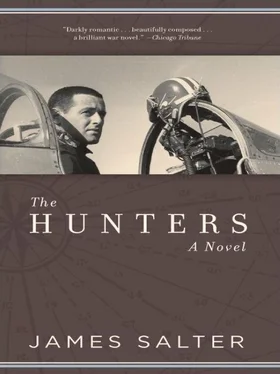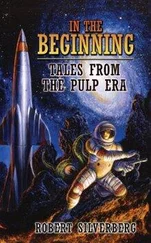Cleve stepped slowly over the side of the ship down to the wing. Suddenly he was tired, not physically; his whole body was still quickened with what had been done and the accident of being alive, but he was tired of everything else.
“You got one of them, anyway,” Imil said flatly.
“Yes.”
Below, near the nose of the ship, there was an exclamation.
“The film didn’t run, Colonel,” somebody called.
The magazine was handed up. Imil turned it over, inspecting it. He scratched at the little green footage window with his thumbnail several times.
“Not a foot,” he said, passing it to Moncavage. “There goes the damned confirmation.”
“It doesn’t matter,” Cleve said.
“Don’t be so goddamned casual. Of course it matters.”
“Not this time.”
“What are you talking about?” Imil asked sharply.
“It was Casey Jones.”
There was a moment of catastrophic silence, and as Cleve watched, he knew it was one for which he would not be forgiven.
“Are you sure?”
Cleve nodded. He hardly heard the words. He was listening to the murmur that had started to run like wind through deep grass.
“Are you sure?” Imil repeated.
Pell interrupted.
“There’s no film, Colonel,” he cried.
“That’s right,” Imil said uncertainly. He looked at Moncavage, who shrugged.
“There’s no one to confirm it now, either,” Pell said.
“No,” Imil agreed. He decided quickly. That was certain enough. “There’s not.”
Cleve looked at them, one by one. Nothing was real. He heard a short, insane cough of contempt leave his lips. He did not know what he was thinking, only that he was far removed, farther than he had ever believed possible.
“Oh yes, there is,” he said blindly.
“Who?”
“I can confirm it.” He drew a sudden breath. “Hunter got him.”
It had come out almost subconsciously. Malice had brought it, and protest, and the sweeping magnanimity that accompanies triumph, but, as soon as he said the words, he realized there were no others that would have made it right.
Billy Hunter would have his day as a hero, and in memory be never less of a man than he had been on his last flight. Cleve could give him that, at least—a name of his own. It was strange. In all that had passed, he had never imagined anything faintly like it, to have searched the whole heavens for his destiny and godliness, and in the end to have found them on earth.
He had kept a pledge. His heart cried out to go among them and tell them how he had fulfilled whatever promise he had, how in the clean sky he had met and conquered a legend. He lay on his cot that night, the draining finally effective, unable to move. He was conscious of nothing except his weakness and surrender to a great fatigue. With his eyes closed to make a double darkness, he lay awake in the still summer night, victorious at last and feeling as little a desire to live as he had ever known.
At the close of June, he had only four missions left. A winter had gone by, a drowsy spring, and part of a summer. In time, the mornings would be cool again with another autumn. To Cleve it seemed as if years and not months had passed. His first days in Korea now were like the vague, distant ones of childhood, simple and carefree. It was hard to associate himself with them. His memory faltered as he tried to retreat to that time so long ago and served him only with unreal, overlapping scenes and conversations.
It was near the end for him, and, as if in its final throes, the terrible fever to win that had held him was stronger than it had ever been. He no longer suffered, though. He had endured it too long. It was a part of him, permanently burned in. He felt untroubled, not satisfied but insensitive at last. He had been cleansed.
Hunter was going to be awarded the Silver Star. Imil had promised that. With a solitary red star beside it, Hunter’s name was listed on the claims board where he had always wanted it. That was not much, compared with Pell’s galaxy, but it would have meant everything to Hunter. And Cleve was at lonely peace with himself. He felt as if he had finally passed from youth into a real maturity, one in which he soberly realized the price that had to be paid to abide by the ideals that were once so bright and compelling. The reckoning was dear; but for all that they had cost him, he held them even more fiercely. He had nothing frivolous remaining to believe in then, only an obdurate residue more precious than a handful of diamonds.
With Pettibone on his wing, he flew north on his ninety-seventh mission. There was not a cloud in the sky. They crossed the Haeju Peninsula and then the edge of an unblemished sea that lay like a sheet of foil in the sunlight, climbing again to those great heights where the mind was transmuted. A fight was developing. The MIGs were taking off from Antung. Somebody was describing the cloud of dust rising there. Cleve could hear the tempo of talk on the radio increasing, like a current as it nears rapids.
Free of the gravitational forces of reality, he sat in the sunshine and looked out over a crystal empire. Antung lay under a dome of clear air that reached every horizon. The river, its bridges, and the earthen town beside it were as small as a history book map. It was almost sleep-inducing. He knew a tranquillity as timeless as a dream of deepest waters. If death were ever to touch him here, it would be with a gesture of equality, with fingertips only. In this high, sterile realm he would fight and, conquering, it seemed, become immortal. He heard a flight dropping tanks. They had sighted MIGs crossing at the reservoir. His heart beat as wildly as ever while he listened. He would be there in a few minutes at the most. There was a joy unlike any he had known going north that day, penetrating farther and farther, north into Casey’s country, into his own.
He was not disappointed. There was a big fight. High and low, in great numbers, the MIGs came streaming south. Every man who wanted to found them, and some who did not. Pell got his seventh.
The debriefing room was wild after they returned, with the first flushed men gathered at the tables and talking all at once. Others came through the door in twos and threes, their flying suits dark with sweat, their faces creased and dirty where the masks had been. They crowded to the tables, talking excitedly as they did, interrupting each other and pausing only briefly to listen.
The room was in sustained confusion. There was a flow of faces moving continually by, faces glistening, reflective, exuberant, dulled. Among them was Pell’s, followed by that of a correspondent interviewing him on his seventh victory. They paused in the very center of the room. Pell continued giving the details, watching the tablet on which they were being scribbled, upside down. He paced himself by the man’s pencil. There were long hesitations. During one, he could hear a voice behind him that was topping the steady surf of those in the room.
“We were separated right at the beginning. I wasn’t able to pick him up again after the first time we broke. They were all over me from then on.”
It was Pettibone. Pell turned around and saw him standing between the two colonels, looking from one to the other as he talked.
“Didn’t you call him?”
“I called him half a dozen times.”
“Well?”
“He never answered. I never heard anything. I called and called.”
“All right,” Colonel Imil said. “Where did it happen?”
They bent over the map as Pell pushed his way through to them and forced a space for himself at the table. Pettibone had trouble locating the spot. His finger wandered over the paper hesitantly as he tried to indicate where the fight had taken place. Finally he traced out an area about ten miles square. It was right on the Yalu.
Читать дальше












